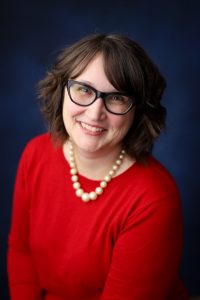Behind the Book: Q&A with Dr. Lynn Neal
By Erin Marlow, Communications Specialist in the Office of the Dean of the College
Dr. Lynn Neal’s book Wearing Their Faith: New Religious Movements, Dress, and Fashion in America, published by Cambridge University Press, offers an insightful analysis of how clothing and material culture function in various New Religious Movements. Through detailed case studies, Dr. Neal challenges superficial cult stereotypes while examining the complex interplay between religious identity and dress—both within specific religious communities and in mainstream fashion. Her work is the first of its kind to focus on the material dimension of religion, providing a deeper understanding of lived religious experience.
Dr. Neal recently spoke with the Dean’s Office about her new book and research.
What inspired you to write this book?
I have done extensive research on the intersection of religion and fashion, as well as New Religious Movements in the United States. Wearing their Faith: New Religious Movements, Dress, and Fashion in America provided a wonderful opportunity to bring together these two research areas and put them into conversation with one another. The result, I think, is a fascinating exploration of the integral role dress and fashion play in creating and sustaining a diverse range of religions.
What was a major challenge that you faced in your research?
Clothing and fashion are ubiquitous, so much so that they are often an
overlooked and taken for granted part of life, including religious life. As a result, the sources (primary and secondary) don’t often give you a lot of information about what people wore, the details of the clothing (the cut of a dress, the fabric, was it handmade or store bought), how people felt wearing a specific garment, etc. So, as a scholar of religion and fashion, you have to be creative, thorough, and diligent.
What would you say is your project’s unique contribution to the field? Larger society?
To my knowledge, this is the first book-length study focused on the role of dress and fashion in New Religious Movements. This follows up on my 2019 book, Religion in Vogue: Christianity and Fashion in America, which also navigated new scholarly waters. My research focus on the relationship between religion, dress, and fashion for the past decade has contributed to broader research on religion and material culture. More specifically, it has made the case for the centrality of dress and fashion in studying the complex dynamics of religious life. This research resonates with those beyond the academy because everyone has a story or memory about what they wore when, a favorite T-shirt, or a special something that grandma made them. It’s a wonderfully accessible and complex topic to explore!
Do you involve students in your research? How do you bring your research into the classroom?
Yes, students have been involved in my research through the classes I teach. For example, in Fall 2024, I taught “Christianity and Fashion.” As part of this class, students wrote entries for my newly launched research-based website, Fashioning Faith, which explores the intersection of religion and fashion. They wrote wonderful entries examining a range of garments and accessories, from Kendrick Lamar’s “Crown of Thorns” (designed by Tiffany & Co.) and Rihanna’s papal-inspired Met Gala look from 2018, to Guo Pei’s 2016 “Legend” collection, inspired by the Abbey of St. Gall. This semester, students in “Religious Sects and Cults” will also contribute as they examine the vital role that material culture plays in New Religious Movements.
What’s next? Do you see your research evolving for future publications? Anyone at Wake Forest you would like to partner with?
Currently, I am focusing on developing the Fashioning Faith website so scholars, students, and other interested individuals have access to scholarly, accessible resources on the topic. The website accepts submissions from scholars and students, so I am hoping that interested students and colleagues at Wake Forest will contribute to or integrate it into their classes as the website grows.
Wearing Their Faith: New Religious Movements, Dress, and Fashion in America


My research focus on the relationship between religion, dress, and fashion for the past decade has contributed to broader research on religion and material culture. More specifically, it has made the case for the centrality of dress and fashion in studying the complex dynamics of religious life.
Dr. Neal

